- News
- Reviews
- Bikes
- Accessories
- Accessories - misc
- Computer mounts
- Bags
- Bar ends
- Bike bags & cases
- Bottle cages
- Bottles
- Cameras
- Car racks
- Child seats
- Computers
- Glasses
- GPS units
- Helmets
- Lights - front
- Lights - rear
- Lights - sets
- Locks
- Mirrors
- Mudguards
- Racks
- Pumps & CO2 inflators
- Puncture kits
- Reflectives
- Smart watches
- Stands and racks
- Trailers
- Clothing
- Components
- Bar tape & grips
- Bottom brackets
- Brake & gear cables
- Brake & STI levers
- Brake pads & spares
- Brakes
- Cassettes & freewheels
- Chains
- Chainsets & chainrings
- Derailleurs - front
- Derailleurs - rear
- Forks
- Gear levers & shifters
- Groupsets
- Handlebars & extensions
- Headsets
- Hubs
- Inner tubes
- Pedals
- Quick releases & skewers
- Saddles
- Seatposts
- Stems
- Wheels
- Tyres
- Health, fitness and nutrition
- Tools and workshop
- Miscellaneous
- Cross country mountain bikes
- Tubeless valves
- Buyers Guides
- Features
- Forum
- Recommends
- Podcast
feature
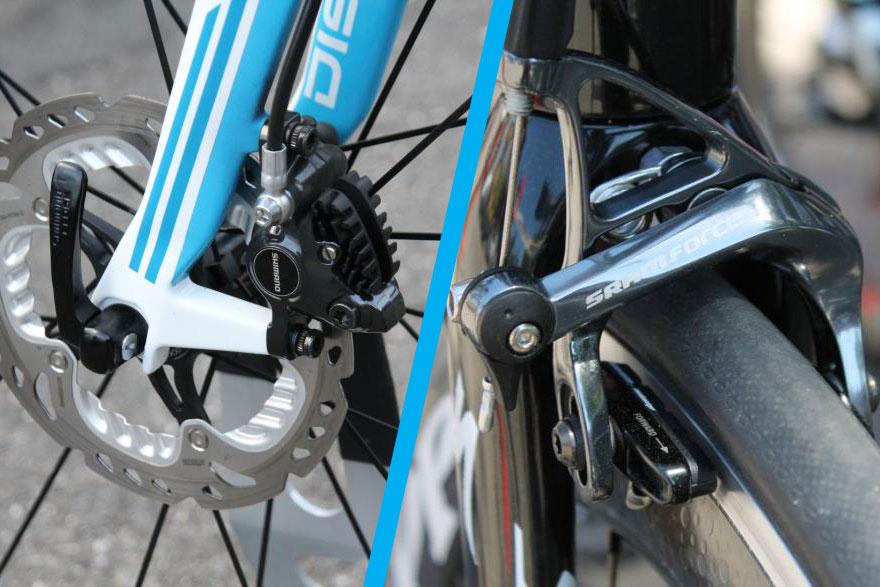 Brakes comp
Brakes compStop your bike brakes squeaking and squealing - try these simple tips
You’re cycling along a quiet country lane enjoying the view and the hum of tyres on tarmac, only for the peace and quiet to be shattered by a loud squealing sound as soon as you pull on the brake levers.
There’s nothing more annoying than squealing brakes. Any unwanted noise from the bike when you’re riding is immensely irritating, but noisy brakes are probably at the top of the list of annoyances.
Related: 9 top tips for setting up your new road bike
Why all the noise?
Unfortunately, squealing brakes can be quite common. Besides the annoying noise, squealing brakes can also mean decreased braking performance. Different combinations of braking surface and brake pad can play a part and the conditions can influence the noise your brakes may or may not make.
“Squealing brakes can occur for several reasons, usually, if you have some grease or oil on the brake pad, rotor or wheel rim or the contact between the braking surfaces is misaligned. New brake pads also need to bed-in for optimum performance,” says Shimano.
While contamination is one cause, vibration is another and can indicate poorly set-up brakes. We’ll go through a few of the most common solutions and remedies for eradicating noisy brakes with rim and disc brakes.
Rim brakes
The first thing you want to do with rim brakes is to ensure the brake calipers and the braking surfaces of the rim and the brake blocks are thoroughly cleaned and in good working condition. Also, check that all bolts securing the caliper to the frame and the brake blocks to the calipers are securely tightened. Any loose parts can cause unwanted brake noise.
Often the cause of brake squeal is contamination, caused by enthusiastic chain lubing or oil picked up riding on the road in wet conditions with lots of puddles. So make sure the rims are cleaned thoroughly with a degreaser to remove any residue oil. There are many brake cleaners on the market that can help to ensure the braking surfaces are in tip top condition.
The noise might be caused by brake blocks in poor condition, being glazed over or unevenly worn. Pick any small pieces of grit out of the brake blocks and use sandpaper or a file to smooth away the top layer especially if they are glazed over. Are the blocks worn out? Then they need replacing - most brake blocks have wear indicators. If the brake blocks are worn unevenly then that can be a sign they are not set up properly.
As well as inspecting the condition of the brake blocks, also pay attention to the rims. Most aluminium rims have a machined surface that is designed to provide a rough surface to provide good braking performance. A buildup of dirt or a worn rim can be detrimental to braking efficiency, so give them a scrub to remove any residue dirt.
If a good clean doesn’t solve the noise, the other likely cause is vibration caused by a poorly set up brake.
“If your brakes judder and squeal when you apply the brake then there's a good chance your brakes aren't meeting the rim or the rotor correctly. Apply the brake and take a look at how the surfaces come together, then, with the brake still applied, loosen the mounting bolt(s) slightly and, if necessary, reposition the pad or the disc brake mount to ensure an accurate connection point,” says Shimano.
One popular solution is to toe-in the pads. Normally brake blocks are installed so they are parallel with the rims. Toe-in requires setting the blocks so that the front section contacts the rim first. You can buy a special tool to do this, or a piece of cardboard of a few millimetres thickness works well - a folded over business card does the job. Loosen the brake blocks, push the piece of card behind the rear of the block, and tighten the bolt.
Sometimes buying new brake blocks is the best solution, especially if they are badly worn. Rim and brake block combination can be a factor. There are many different brake block compounds available, designed for different rim materials, conditions and demands. Sometimes changing the type of brake blocks can solve the issue of noisy brakes.
Other causes of brake squeal can be due to any play in the braking system or even the hub bearings. A small amount of play in the wheel bearings can also contribute to squealing brakes. Some brake calipers are light and flexy and this can contribute to unwanted play as the brake block contacts the surface of the rim.
Disc brakes
The causes of noisy disc brakes are much the same as it is for rim brakes. Again, the most common cause of disc brakes squealing is due to contamination of the rotor or pads. That’s why you have to be very careful when using spray lubricants on a bicycle with disc brakes, probably best to avoid using spray lubes anywhere near a bike with disc brakes.
“Cleaning your rotors or wheel rims regularly with a specific (oil-free) disc brake degreaser is a good way to avoid squealing brakes. Cleaning your pads too can help quieten things down - you can try some sandpaper or grinding the pads - but if the grease has soaked through the pad, you might need to replace them. Don't use a degreaser or chemicals on brake pads, though,” says Shimano.
First, you want to ensure all the braking components and surfaces are spotlessly clean. You can buy dedicated disc brake cleaners and sometimes this can be an instant fix. An alternative and common remedy is isopropyl alcohol. Use it to clean the disc rotors with a small rag. It’s easier to remove the rotor to do this, but you can do it while attached to the wheel.
The disc pads can also become contaminated. Unlike rim brake blocks, it’s not quite as easy to clean pads if they are contaminated, largely because you have to completely remove them from the bike in the first place. Sometimes a bit of scrubbing with sandpaper can remove the top layer of residue and any glazing that has occurred, and this can often work reasonably well, but if it's really bad, you might have to buy new pads. Some people say you can bake brake pads in the oven to cure this problem, but it's not something we've ever tried so can't vouch for its success rate.
Related: All you need to know about replacing disc brake pads
The bedding in process with disc brakes is very different to rim brakes and is worth doing properly following installation of new pads. It can make a big difference to the performance. The pads will leave small deposits of material on the disc rotor and the best way to bed in pads is to ride along the street at a decent speed and pull firmly on the brake levers. Repeat this procedure a few time to ensure the discs are adequately bedded in.
The other cause of noise with disc brakes can be down to the caliper not being perfectly lined up with the rotor, or due to a slight bend in the rotor. Disc rotors can bend quite easily, which is why you have to be careful when travelling with the bike in the car or plane for this reason. They can be easily straightened with careful use of an adjustable spanner or a professional tool if you’re feeling flush.
To ensure the rotor is positioned evenly over the rotor, first loosen the two caliper bolts, then while squeezing the brake lever, tighten the bolts. Sometimes this works fine, but sometimes you might need to make some small adjustments by eye - the clearance between the rotor and brake pads is very minimal. You're aiming to have the caliper centrally positioned over the disc rotor with equal clearance either side.
Related: Everything you need to know about disc brakes
Hopefully, those steps will help alleviate your noisy brakes. Do you have any top tips that you swear by for fixing squealing brakes?
David worked on the road.cc tech team from 2012-2020. Previously he was editor of Bikemagic.com and before that staff writer at RCUK. He's a seasoned cyclist of all disciplines, from road to mountain biking, touring to cyclo-cross, he only wishes he had time to ride them all. He's mildly competitive, though he'll never admit it, and is a frequent road racer but is too lazy to do really well. He currently resides in the Cotswolds, and you can now find him over on his own YouTube channel David Arthur - Just Ride Bikes.
Latest Comments
- lesterama 1 sec ago
Something something BC slow-motion crash. And, to be honest, it's painful to watch the way the sport is going downhill here.
- wtjs 13 min 19 sec ago
I hope this outcome brings some form of closure for Roseanne’s wider family and my thoughts very much remain with them today...
- DanaColby85 15 min 17 sec ago
I come very much from a cycle-touring perspective. Look under 'Touring' on many retail websites now and you only get gravel bikes, which to me are...
- mark1a 33 min 13 sec ago
I take a different view in that hookless rims serve no purpose other than to be made more cheaply for an equivalent weight allowing the...
- David9694 2 hours 55 min ago
Double yellow lines to be reintroduced around Faversham Guildhall and Market Place to ‘protect’ views of town’s historic landmarks and character...
- Gkam84 15 hours 21 min ago
I think that is why blind eyes have been turned in the UK, internationally aswell, with things like the Redhook crits, there were many licensed...
- mdavidford 16 hours 30 min ago
Ahem - other esporters(?) might be rather surprised to hear that the UCI has taken over their events - I think that would be the Cycling Esports...
- Bungle_52 16 hours 39 min ago
I wonder how he got to the game?
- OldRidgeback 16 hours 41 min ago
You'd need some good wet weather gear for that ride too.
- OnYerBike 19 hours 5 min ago
It seems to me that the most likely explanation is that whoever provided that quote fails to grasp the difference between a "public right of way"...
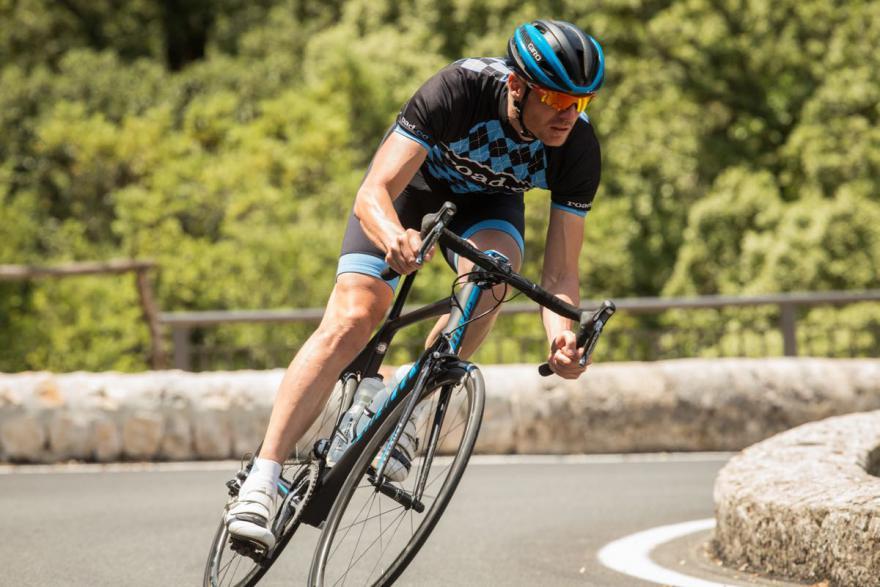
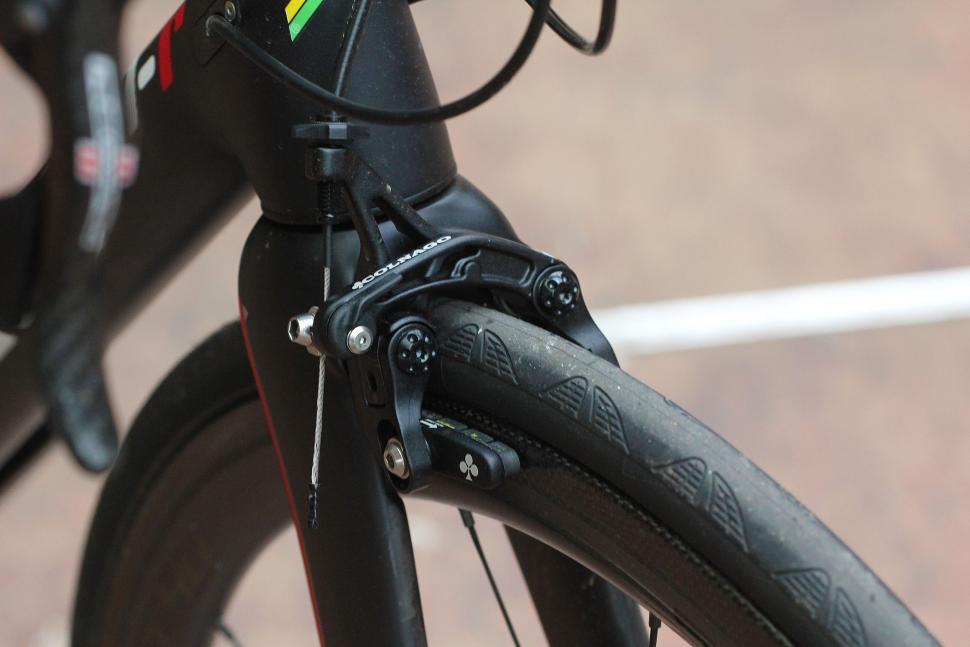
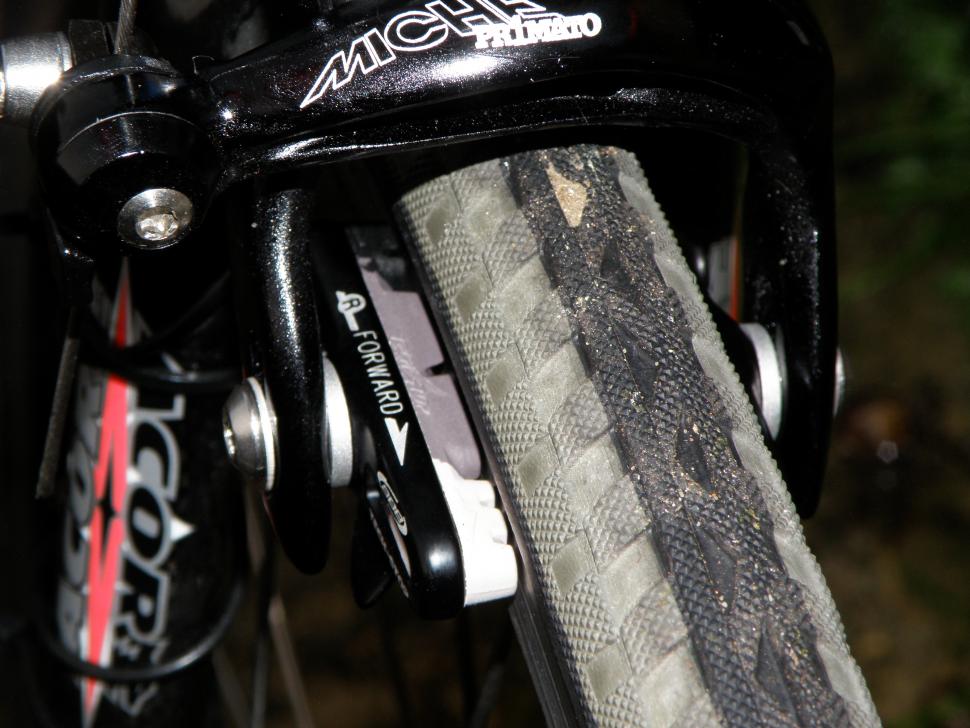
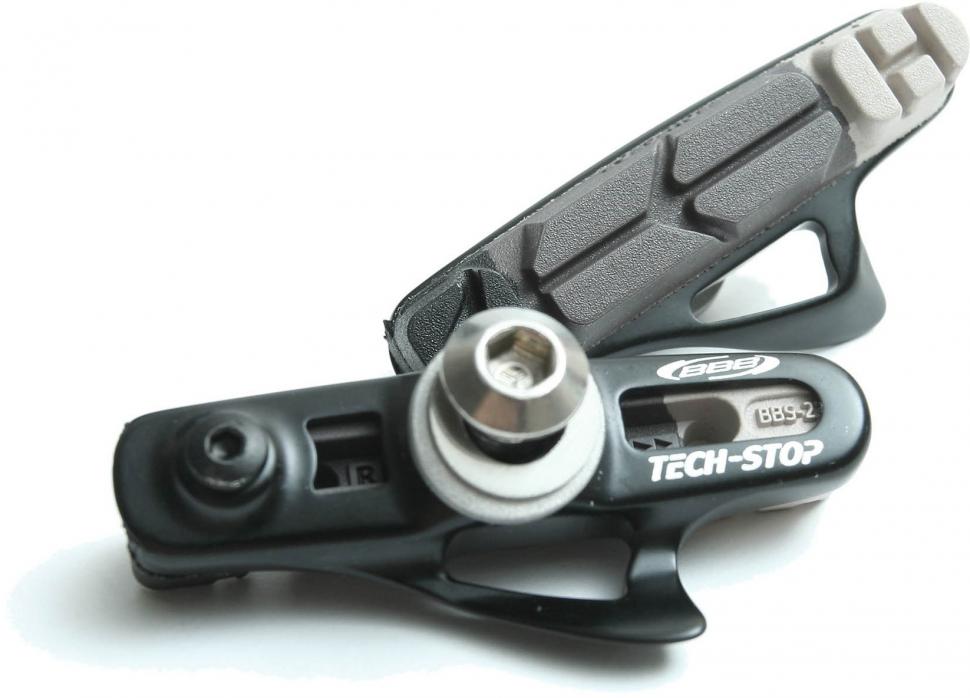
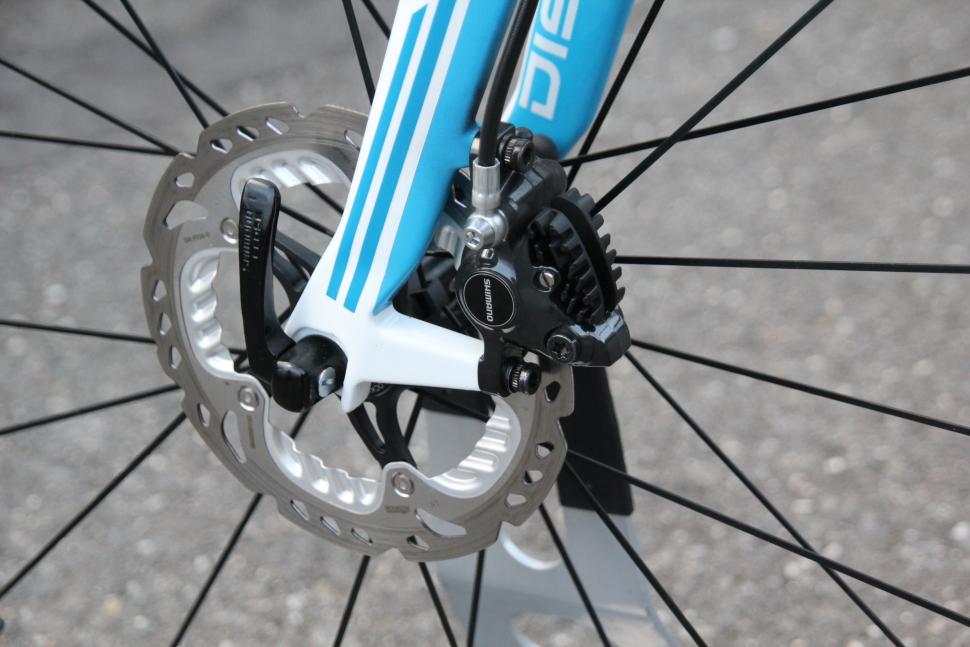
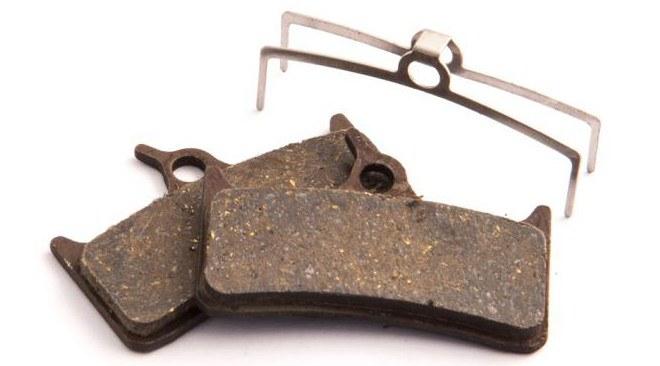
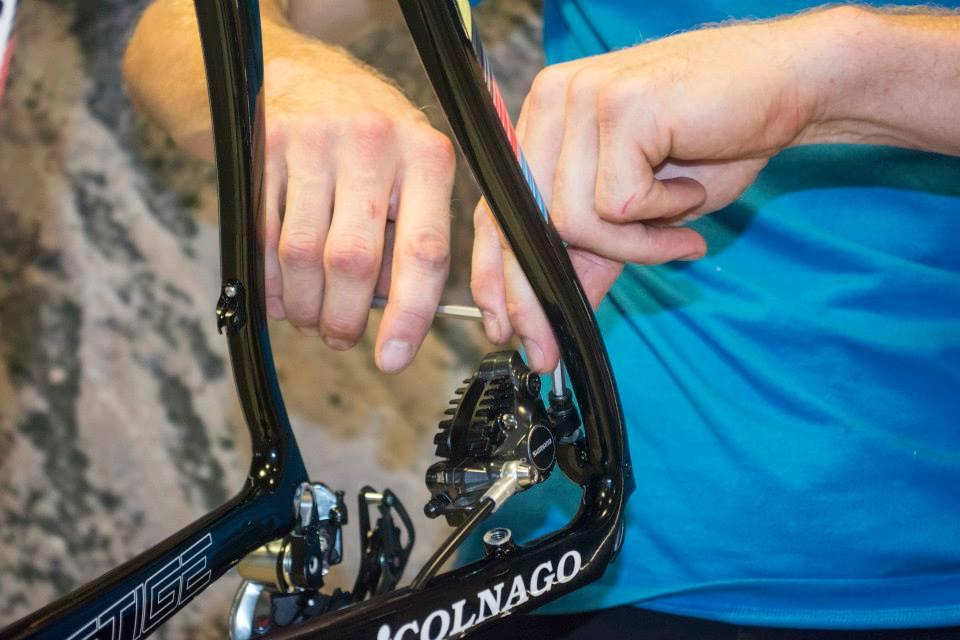
Add new comment
29 comments
Ug. Another long and at times wet gravel ride today.
Had fitted some automotive anti-squeal tape to the back of the pads so was curious to see how they performed.
In the dry, no change, nice and powerful and quiet. In the wet - same horrendous noise!
Last ditch solution, I'm going to Dremel some shallow sipes in the pad, like old school v-brake pads. Might affect power a wee bit but it's just gravel biking 😎
Spoke to my local shop, a pretty renowned custom builder who sell a lot of gravel builds. They admitted discs just do this in cold wet conditions.
Would be nice if road.cc could do a proper article about it, maybe get some feedback from manufacturers, rather than just letting them hide behind excuses about contamination etc.
In the meantime, I'm getting a custom frame built with v-brake mounts, life is too short to avoid wet weather riding because of noisy brakes! 😎
Always worth checking play in headset to eliminate juddering in last metres when coming to a complete stop. Never had squealing with MTBs but cable discs on commuter howl like stuck pig. Pedestrians notice and react. Unlike when I use my bell. So really I'd like advice on how to make 'em louder without deterioration of braking performance.
Might see if my lbs can face the front disk mounts.
The summer has been very dry, and I have had the luxury of relatively silent braking.
The deep filth brings on the screaming, the facing would be the last step.
PP/Sriracha - I have had another look and I can see a very slight wobble but with my cackhandedness, I think I would only make it worse if I tried a slight bend. Just readjusted the rear brake instead as that was rubbing very slightly.
What about the judder? It would only be a guess, but I would suspect something was not done up tight, like the bolts holding the calipers to the fork. Noises, squealing, that's annoying, but if the brakes were juddering I would get it to a professional if the cause/remedy eluded me.
I don't think a slight warp in the disc has any noticeable effect - certainly mine are not dead true and they work just fine. So long as the disc is not chafing a pad then I leave well alone.
I did take it back for a post purchase tune up and mentioned the brakes. Not sure they actually did anything at all though.
It has been raining heavily here so I won't find out if my tightening has achieved anything until Monday. I'll check the torque setting tomorrow.
I've tried a bit of casual trueing of my brake discs and found it took quite a lot of force/bending to effect much change as the discs are quite springy. I operate at a high level of cackhandedness, so you'd probably be fine with trying a bit of careful trueing.
The cure to my horrendous brake squealing was to move away from metal pads (I'm now running ceramic pads from https://noahandtheo.co.uk). I've also experienced judder from some Prime metal pads (with carbon fibre backing) from Wiggle but that was only at very low speeds (i.e. the last metre or so when coming to a stop). I was also suffering some distortion of the discs after heavy braking which was presumably due to heat, but that seems to have resolved itself after switching away from metal pads though it may have also been after minor adjustments of the caliper position.
I think it's helpful, in any discussion of disc brake noise, to say what type of pads are being used - as here (thank you). The blurb from the manufacturers certainly seems to say that resin/organic pads are the quietest, whilst metallic pads are noisier.
...and there's very little mention of ceramic pads which is why I thought I'd give them a go.
I contaminated my (new) Ultegra discs with oil and tried everything but failed to stop them howling until ... blowtorch! Gently roast the pads and dont let them catch fire, it really works
Okay, so I've tried this, but should I have removed the pads first?
As a newcomer to Road.cc, have to say that I found the comments on this old article to be fascinating in comparison with comments on more recent articles.
Seems that Road.cc used to be about cycling, with article read and commented on by cyclists, whilst now far too many of the comments are tiresome political sniping and general moaning.
Is that working for you, Road.cc?
Never had disc brakes until a couple of months ago. I get some judder from the front, and I think the rotor is very slightly bent - "They can be easily straightened with careful use of an adjustable spanner or a professional tool"
Any instructions on that ?
So, just like a wheel rim, find the spot that is bent by rotating the wheel back and forwards against something fixed - perhaps a dial gauge if you have one or simply the caliper and brake pads. It helps if you put a sheet of white paper behind where you are viewing and good light source. It can be difficult to spot against a dark background. You should be able to see where the 'buckle' in the rotor is.
Then put the adjustable spanner on the rotor at that point. Screw the adjustable spanner flats together to sandwich the rotor. Now use the handle of the spanner as a lever to gently bend the rotor in the correct direction to straighten it. Keep doing this until your rotor is fully true again when you spin the wheel.
No need to "think" whether the rotor is bent. Just spin the wheel (ideally with the bike in a workstand) and look and listen. If it is bent you will see the wobble if you sight down the aperture of the calipers. You will also hear an intermittent scraping sound if it is bad enough, or if less pronounced you will hear it as you progressively squeeze the brake lever.
However I'm not sure a slightly bent rotor would cause brake judder, so might be something else going on. My ha'pennth worth is that I use resin (organic) pads (Shimano K03S) and never had any troubles.
At least road.cc has written an article on the subject, all you've contributed is the fairly redundant advice 'adjust them properly'.
Adjustment is just step 1, and is usually the easiest step. Once you know the calliper is aligned properly (two bolts, pull the lever, use an alignment guage if you're feeling fancy, maybe even get a shop to face the mounts) then you have exhausted the possibilities of 'adjustment'.
After that you have to clean everything, sand rotors, maybe replace pads, make sure pads are bedded in properly, hope that your particular choice of pads happens to work with your particular choice of rotor, and that neither happen to be prone to squeeling, etc. etc. None of this is 'adjustment' and a lot of it seems to just be guesswork, see how many conflicting opinions you'll get as to which compound of pad is quietest etc.
Will give it a shot with my Spyres, hoping I can wind them out enough to make up for the damping layer. Doesn't look very thick in the images.
I have the luxury of not having gone full hydraulic so if I can make my Spyres quiet enough I'll just stick with them on future bikes, think a complete assembly of Spyres works out cheaper and lighter than hydraulics anyway so there's a silver lining.
Might give the copper grease thing a try first, was going to replace the stock Spyre pads anyway so no worries if they end up contaminated...
I wouldn't bother anyway. I just tried it and now I need to rebleed the brake. The tape takes up too much room so I had to let a dribble of fluid out and it still didn't feel right so I removed it.
Helicopter tape? Might get some interesting when the brakes get hot...
I think that car stuff will be too thick. I've noticed car brake pads tend to come with a sheet of polymer material stuck on the back of each pad nowadays. Has anyone tried sticking a piece of helicopter tape to the back of pads? It would fit and might stop squealing by damping the high frequency vibration that causes squealing.
Campag brake pads also have this backing material on the pads. I'm told by a man with deep knowledge of Campag's R&D process that getting this material right is the main reason that the firm was late to the disc brake party. Tullio himself had insisted that they would not sell disc brakes at all until they could sell *silent* disc brakes.
Might try a set of these actually
https://www.ebay.co.uk/itm/LARGE-EBC-ANTI-SQUEAL-SELF-ADHESIVE-BRAKE-PAD...
Would be worried about them taking up too much space between pads and rotors but hopefully the Spyres will have enough adjustment to accommodate them.
Have still to solve the wet weather squeel on my commuter, first SRAM brakes and now TRPs, with a variety of rotors.
It's so bad I'll just not ride that bike in the wet now.
I remember from my MTB days that Shimano sintered pads were relatively quiet in the wet, but I can't find any Shimano brand sintered pads that will fit TRP callipers. Alternatively was going to try Swisstop organic pads which seem to have a reputation for being quiet.
Also tempted by some Shimano rotors with the aluminium carrier, seems like they'd be stiffer and thus less likely to resonate and squeel.
I'm really reluctant to try the copperslip solution, does that not inevitably end up contaminating the pads once enough water has dribbled through the brake etc?
If I could afford it I'd just go Campag, seems like they've actually thought about it a little bit and developed pads with a damping layer on the back to reduce squeel.
Really really really want to find a solution as it's stopping me taking the leap and buying a new disc brake road bike, which is a shame as non-disc road bikes are becoming like hen's teeth (if you're want 'endurance' geometry anyway...).
The rim brakes of my bicycle make noises only when the weather is wet ( especially in the morning when I need to use it to go out). Any help, please?
Give the brake tracks a really good scrub, try some different pads... SwissStop Yellows?
I will try it, thank you very much
I bought some upgrade disc brake wheels for my road bike. They squealed from the off. Tried everything - flaming the pads, cleaning the rotors, hot water, cold water. Still squealed. I also experienced noticeable front brake rub when riding out of the saddle. The front hub end caps were just push-in jobs, so I thought maybe some flexing was causing vibration and squealing. Anyway, I swapped them out for the stock wheels on my commuter bike. Problem solved immediately. Plus the upgrade wheels don't squeal at all now they're fitted on my commuter bike. No brake rub either. Go figure!
Had a horible problem with disc squeel after getting some brake fluid on the rotor. Finally I read that rubbing talc powder into the disc followed by half a dozen stop down the biggest hill you can find was the best cure. Worked a treat for me.
Or just get some disc cleaner - few quid for a lot from Eurocarparts and others...